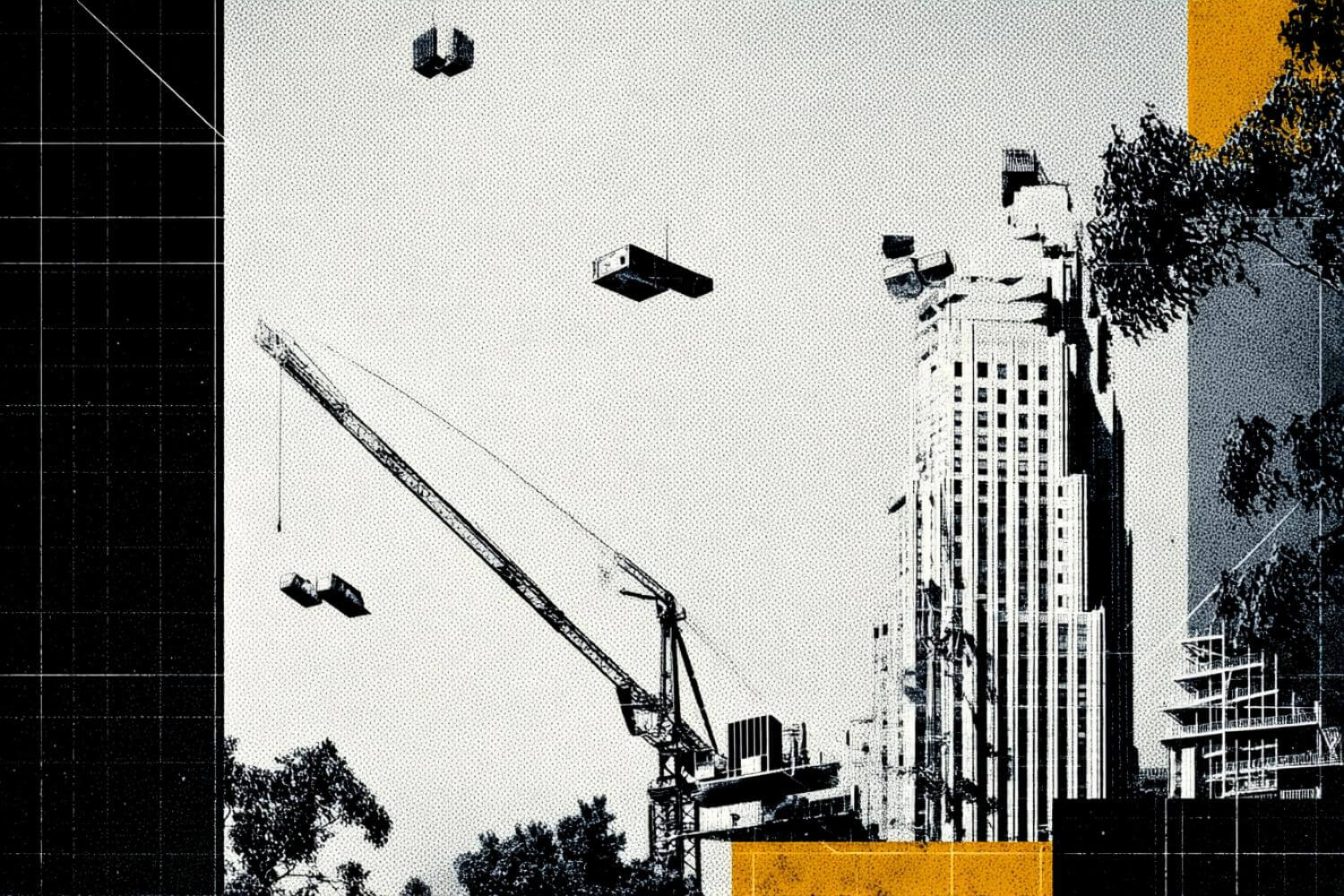Construction projects are notorious for running over budget and behind schedule. In fact, McKinsey reports that large construction projects typically take 20% longer to finish and cost up to 80% more than planned. For project managers, that means constant firefighting: juggling schedules, resources, compliance documents, and client expectations.
This is where artificial intelligence (AI) is changing the game. Instead of relying on static schedules or manual reporting, AI-powered project management tools can:
- Predict potential delays before they happen.
- Automate documentation, compliance, and reporting.
- Optimize schedules and resource allocation in real time.
- Provide instant insights from thousands of past projects.
- Even monitor on-site progress using computer vision.
The result? Less guesswork, more predictability, and projects that stay on time and within budget.
In this guide, we’ll break down the best AI tools for construction project management in 2025. From industry giants like Procore and Autodesk to specialized platforms like ALICE, Buildots, and nPlan. Whether you’re managing a multi-million-dollar commercial build or overseeing smaller residential projects, you’ll discover the AI solutions that can help you save time, cut costs, and deliver with confidence.
Why AI Matters in Construction Project Management
![9 Best AI Tools for Construction Project Management in 2025 [UPDATED] 1 AI Adoption In Construction Project Management 2023 to 2030 Observed Vs. Projection](http://foundonai.com/wp-content/uploads/2025/08/AI-Adoption-In-Construction-Project-Management-2023-to-2030-Observed-Vs.-Projection-1024x610.png)
Managing a construction project is like conducting an orchestra, except the instruments are heavy machinery, subcontractors, design changes, compliance requirements, and budgets that can spiral overnight. Even with experienced teams, delays and overruns are common.
AI offers a way to bring order to that chaos. Unlike traditional project management tools that simply track tasks, AI-driven platforms can actively analyze, predict, and optimize project outcomes.
Here’s how AI is making an impact in construction project management:
- Predictive Scheduling: AI tools simulate thousands of possible project scenarios to highlight the most efficient timelines and warn you about likely delays before they occur.
- Cost Forecasting: Machine learning models crunch historical data to generate accurate cost estimates, helping teams avoid budget overruns.
- Resource Optimization: AI ensures labor, equipment, and materials are allocated where they’ll have the highest impact.
- Document Automation & Compliance: Instead of drowning in RFIs, submittals, and compliance reports, AI systems handle repetitive paperwork in seconds.
- Real-Time Site Monitoring: Computer vision tracks on-site progress and compares it with BIM models, reducing human error in reporting.
- AI Copilots for PMs: Think of these as assistants that draft reports, summarize meetings, and answer project-specific questions instantly.
The bottom line? AI doesn’t replace project managers, it gives them superpowers. With less time spent chasing paperwork and reacting to crises, PMs can focus on strategy, decision-making, and client relationships.
![9 Best AI Tools for Construction Project Management in 2025 [UPDATED] 2 Average Savings From AI In construction](http://foundonai.com/wp-content/uploads/2025/08/Average-Savings-From-AI-In-construction-1024x611.png)
Criteria for Choosing AI Tools in Construction
Not all AI tools are created equal and not every construction firm needs the same features. Before jumping into specific platforms, it’s important to define what matters most when evaluating AI solutions for project management.
Here are the key factors to consider:
- Industry-Specific vs. General Tools
- Some AI platforms are built exclusively for construction (e.g., ALICE, Buildots). Others are general project management tools (e.g., Monday.com AI, ClickUp AI) that can be adapted.
- If you run complex, large-scale projects, construction-specific tools usually deliver more ROI.
- Integration with Existing Systems
- Many firms already use platforms like Procore, Autodesk, or Primavera. The best AI tools should integrate seamlessly, so you don’t waste time on data migration or duplicate workflows.
- Scalability
- A small residential contractor doesn’t need the same AI firepower as a multinational engineering firm. Look for tools that can grow with your company’s project size and complexity.
- Onsite vs. Remote Usability
- Mobile-friendly AI tools with offline modes are critical for field teams who may not always have stable internet access.
- Pricing & ROI
- AI tools can range from $30/user/month for general PM software to six-figure enterprise licenses. The right tool isn’t the cheapest one, it’s the one that saves more in delays and overruns than it costs to implement.
- Ease of Use & Adoption
- Even the most advanced AI is useless if your team doesn’t use it. Look for intuitive interfaces, strong training support, and good customer service.
By keeping these factors in mind, you’ll be able to choose the right AI tool, not just the most popular one.
Best AI Tools for Construction Project Management
1. Procore + AI Features
![9 Best AI Tools for Construction Project Management in 2025 [UPDATED] 3 Procore AI Features](https://foundonai.com/wp-content/uploads/2025/08/Procore-AI-Features-1024x474.jpg)
Procore is one of the most widely adopted construction project management platforms, designed specifically for contractors, developers, and large construction firms.
With its recent AI upgrades, Procore is evolving from a workflow hub into an intelligent assistant for construction management. Its AI copilot helps project managers draft RFIs, summarize daily logs, generate instant reports, and predict potential risks before they disrupt timelines.
By combining document control, scheduling, cost tracking, and field collaboration with machine learning, Procore positions itself as the go-to AI-driven platform for enterprise-level construction project delivery.
Key AI Features:
- Procore Copilot: an AI assistant that drafts RFIs, summarizes meeting notes, and generates reports.
- Predictive Risk Alerts: flags potential safety, quality, or scheduling risks.
- Automated Document Review: AI scans submittals and compliance docs to speed up approvals.
Best For: Large contractors, general contractors, and firms managing multi-million-dollar projects.
Pricing: Enterprise-level, custom quotes only.
Pros:
- Deep integration with existing Procore modules.
- Strong industry adoption and community support.
- Designed specifically for large-scale construction workflows.
Cons:
- High cost makes it less ideal for smaller firms.
- Complexity requires dedicated training for staff.
2. Autodesk Construction Cloud (AI-Powered)
![9 Best AI Tools for Construction Project Management in 2025 [UPDATED] 4 Autodesk Construction Cloud](http://foundonai.com/wp-content/uploads/2025/08/Autodesk-Construction-Cloud-1024x552.jpg)
Autodesk Construction Cloud is an end-to-end solution that unifies design, planning, and construction workflows. Known for its deep BIM (Building Information Modeling) integration, Autodesk now layers AI on top to power clash detection, automated risk analysis, and generative design insights.
This means construction managers can identify conflicts early, optimize project workflows, and reduce costly rework. By bridging the gap between architects, engineers, and project managers, Autodesk Construction Cloud acts as a data-driven AI platform for construction coordination, collaboration, and risk reduction.
Key AI Features:
- Clash Detection: AI identifies design conflicts early in BIM models.
- Generative Insights: recommends optimized workflows for project teams.
- Data-Driven Risk Analysis: highlights patterns from historical projects to reduce errors.
Best For: Firms that already use Autodesk for design and want seamless integration with construction project management.
Pricing: Enterprise-level, custom.
Pros:
- Strong BIM integration.
- Ideal for design + build firms.
- Reduces costly design conflicts.
Cons:
- Steeper learning curve for PMs without design experience.
- Pricing and complexity may overwhelm smaller teams.
3. ALICE Technologies
![9 Best AI Tools for Construction Project Management in 2025 [UPDATED] 5 ALICE Technologies](http://foundonai.com/wp-content/uploads/2025/08/ALICE-Technologies-1024x553.jpg)
ALICE Technologies is the first AI-powered construction simulation and scheduling platform, built to optimize mega and infrastructure projects. Instead of static Gantt charts, ALICE uses advanced algorithms to simulate millions of potential scheduling scenarios, helping teams select the most efficient sequence of activities.
When disruptions occur (like material delays or labor shortages) ALICE instantly generates a new optimized plan. This makes it a dynamic construction scheduling engine that can reduce costs, minimize downtime, and maximize resource efficiency. ALICE has become a must-have AI tool for complex, large-scale projects where time and cost overruns can reach millions.
Key AI Features:
- Scenario Simulation: generates multiple “what-if” timelines to optimize cost and time.
- Dynamic Rescheduling: instantly recalculates schedules when changes occur (e.g., material delays, labor shortages).
- Cost Impact Analysis: shows the financial trade-offs of different project decisions.
Best For: Large infrastructure, commercial, and industrial projects where small inefficiencies can cost millions.
Pricing: Enterprise-level (typically $$$$).
Pros:
- Handles massive complexity that traditional tools can’t.
- Reduces the risk of costly overruns.
- Visual “what-if” modeling makes decision-making easier.
Cons:
- Too advanced (and expensive) for smaller projects.
- Requires significant training for effective use.
4. Buildots
![9 Best AI Tools for Construction Project Management in 2025 [UPDATED] 6 Buildots](http://foundonai.com/wp-content/uploads/2025/08/Buildots-1024x492.jpg)
Buildots transforms construction project tracking through computer vision and artificial intelligence. Site teams wear 360° helmet-mounted cameras during routine walks, and Buildots’ AI automatically processes the footage to compare actual on-site progress with BIM models and project schedules. The platform delivers detailed reports on what’s ahead, on track, or falling behind schedule. This eliminates manual inspections, ensures accountability, and reduces disputes.
By combining real-time site monitoring with data-driven insights, Buildots acts as an AI-powered reality capture system that bridges field execution with digital planning.
Key AI Features:
- Automated Progress Tracking: captures real-time construction updates without manual reporting.
- BIM Comparison: identifies deviations between planned and actual builds.
- Delay Alerts: flags potential schedule slips early.
Best For: Contractors and developers who need real-time project tracking without manual reporting.
Pricing: Subscription-based, mid-to-high tier depending on project size.
Pros:
- Saves project managers hours of manual site inspections.
- Highly accurate progress tracking with visual proof.
- Integrates with BIM workflows.
Cons:
- Requires investment in camera hardware + training.
- Works best with BIM-heavy projects; less value for small builds.
5. nPlan
![9 Best AI Tools for Construction Project Management in 2025 [UPDATED] 7 nPlan](https://foundonai.com/wp-content/uploads/2025/08/nPlan-1024x576.jpg)
nPlan is a construction risk management platform that uses machine learning trained on millions of past project schedules. Its AI predicts where future delays are most likely to occur, quantifies risk exposure, and highlights the weakest parts of a construction plan.
Unlike traditional scheduling software, nPlan doesn’t just track activities but it also benchmarks your project against a massive historical dataset and provides a probability-based assessment of success.
For contractors, owners, and lenders, this makes nPlan a powerful AI-driven solution for risk forecasting, delay prevention, and claims reduction in construction projects.
Key AI Features:
- Predictive Analytics: assigns risk probabilities to tasks and milestones.
- Historical Benchmarking: compares your project plan against a massive dataset of completed projects.
- Early-Warning Alerts: highlights the most vulnerable areas of your schedule.
Best For: Developers, contractors, and infrastructure projects with high financial exposure.
Pricing: Subscription-based, enterprise-focused.
Pros:
- Unique focus on risk analysis.
- Reduces claims and litigation exposure.
- Data-driven insights improve confidence in schedules.
Cons:
- Doesn’t handle task management itself—works best as a complement to PM software.
- Enterprise cost may not fit smaller firms.
6. Togal AI
![9 Best AI Tools for Construction Project Management in 2025 [UPDATED] 8 Togal AI](https://foundonai.com/wp-content/uploads/2025/08/Togal-AI-1024x575.jpg)
Togal AI combines robotics and artificial intelligence to automate rebar assembly, one of the most labor-intensive processes in construction. Its AI-driven robots bend, cut, and place rebar with higher speed and precision than human crews, improving efficiency and safety.
By analyzing past workflows, Toggle optimizes labor allocation, reduces material waste, and accelerates project timelines. While highly specialized, Toggle represents the future of AI-driven construction robotics, proving that automation and AI can work together to transform repetitive, error-prone tasks in large-scale builds.
Key AI Features:
- AI + Robotics Integration: guides robots in bending, cutting, and assembling rebar.
- Efficiency Tracking: measures productivity and compares against traditional methods.
- Error Reduction: minimizes human mistakes in rebar placement.
Best For: Contractors in commercial and infrastructure projects looking to automate repetitive labor.
Pricing: Custom pricing, with hardware requirements.
Pros:
- Huge labor and time savings in rebar work.
- Improves safety by reducing manual handling of heavy materials.
- Clear ROI on large-scale projects.
Cons:
- Hardware investment required.
- Very niche use case (rebar only).
7. SmartPM Technologies
![9 Best AI Tools for Construction Project Management in 2025 [UPDATED] 9 SmartPM](https://foundonai.com/wp-content/uploads/2025/08/SmartPM-1024x544.jpg)
SmartPM is an AI-powered construction analytics and project controls platform that focuses on schedule integrity, performance tracking, and claims mitigation. By ingesting project schedules, it runs diagnostic tests to evaluate quality, identify hidden risks, and provide transparency into project health. Forensic-level analytics also enable contractors and owners to pinpoint causes of delay, strengthen claims, and improve accountability.
Unlike general PM tools, SmartPM is built specifically for construction, making it a specialized AI analytics platform for schedule diagnostics, predictive performance analysis, and risk mitigation.
Key AI Features:
- Schedule Diagnostics: evaluates project plans for weaknesses.
- Delay Analysis: identifies the root cause of delays.
- Predictive Performance Tracking: shows where the project is heading based on current trends.
Best For: General contractors and owners needing strong oversight and claims protection.
Pricing: SaaS subscription (mid-to-high tier).
Pros:
- Prevents disputes with transparent analytics.
- Strong reporting for executives and clients.
- Helps firms strengthen project controls.
Cons:
- Not as hands-on as scheduling or site tools.
- More valuable for oversight than daily management.
8. Assignar (with AI Add-ons)
![9 Best AI Tools for Construction Project Management in 2025 [UPDATED] 10 Assignar](https://foundonai.com/wp-content/uploads/2025/08/Assignar-1024x528.jpg)
Assignar is a construction workforce and compliance management platform that helps contractors streamline scheduling, crew management, and equipment utilization. With AI add-ons, it introduces predictive labor scheduling, compliance risk detection, and resource optimization insights.
Designed for field-heavy operations, Assignar provides mobile-first usability, making it especially effective for subcontractors, civil contractors, and mid-sized firms juggling multiple job sites. As an AI-enhanced workforce management solution, Assignar helps ensure crews are compliant, well-utilized, and deployed where they deliver the highest ROI.
Key AI Features:
- Predictive Workforce Scheduling: forecasts labor needs based on past projects.
- Compliance Tracking: automates safety checks, licenses, and certifications.
- Resource Utilization Insights: identifies under- or over-utilized crews and equipment.
Best For: Mid-size contractors juggling multiple job sites and compliance-heavy projects.
Pricing: SaaS, tiered pricing.
Pros:
- Strong focus on workforce + compliance.
- Mobile-first design for field usability.
- Easy integration with existing workflows.
Cons:
- Limited to workforce/compliance (not a full PM suite).
- Smaller adoption compared to giants like Procore.
9. General AI-Powered PM Tools (Useful for Construction Teams)
General-purpose AI project management platforms are not built for construction specifically, but they can still deliver significant benefits for small and mid-size firms. Tools like ClickUp AI, Asana AI, Monday.com AI, Notion AI, and Wrike AI help automate reporting, generate project updates, draft documentation, and predict task delays.
For firms not ready to invest in specialized enterprise platforms, these solutions provide an affordable entry point into AI-assisted project management. While they lack deep BIM or field integrations, they are ideal for contractors seeking lightweight AI-driven productivity gains in communication, task tracking, and documentation.
Top Picks:
- ClickUp AI: generates reports, summarizes updates, automates task documentation.
- Asana AI: predicts task delays, prioritizes workloads, drafts project updates.
- Notion AI: useful for knowledge management and drafting SOPs.
- Monday.com AI: automates workflows, generates progress updates, and integrates with field data.
- Wrike AI: highlights project risks, provides smart prioritization, and integrates with enterprise tools.
Best For: Small to mid-sized firms looking for affordable, flexible AI assistance without the complexity of enterprise platforms.
Pricing: Typically $10–$30/user/month.
Pros:
- Affordable entry point into AI PM.
- Easy to implement and scale gradually.
- Great for firms not ready for Procore/Autodesk-level investments.
Cons:
- Not built specifically for construction.
- Limited integration with BIM and specialized construction tools.
Comparison Table: Best AI Tools for Construction Project Management
| Tool | Best For | Key AI Features | Pricing | Integration |
|---|---|---|---|---|
| Procore + AI | Large contractors, enterprise firms | AI copilot, risk alerts, automated submittals review | Custom (enterprise) | Procore ecosystem |
| Autodesk Construction Cloud | Design + build firms | Clash detection, generative insights, risk analysis | Custom (enterprise) | Autodesk suite, BIM |
| ALICE Technologies | Megaprojects, complex schedules | Scenario simulation, cost impact analysis, dynamic rescheduling | $$$$ (enterprise) | Limited direct PM integration |
| Buildots | Real-time site monitoring | Computer vision, BIM comparison, delay alerts | $$–$$$ (subscription) | BIM-heavy workflows |
| nPlan | Risk-heavy projects | Predictive analytics, benchmarking, delay alerts | $$–$$$ (enterprise) | Scheduling tools |
| Toggle AI | Contractors exploring robotics | AI + robotics for rebar assembly, efficiency tracking | $$$ (custom) | Hardware integration |
| SmartPM Technologies | Delay analysis, claims mitigation | Schedule diagnostics, forensic delay analysis | $$ (SaaS) | Schedule imports |
| Assignar | Workforce & compliance management | Predictive scheduling, compliance tracking | $$ (SaaS tiers) | Mobile-first, API integrations |
| ClickUp AI, Asana AI, Monday AI, Notion AI, Wrike AI | Smaller construction firms | AI task summaries, reporting, prioritization | $10–$30/user/month | General PM integrations |
Future of AI in Construction Project Management
AI in construction is still in its early innings. Most firms today are experimenting with features like predictive scheduling, automated reporting, and real-time monitoring. But over the next few years, we’ll see far more advanced applications that will reshape how projects are delivered:
- Generative Scheduling & Design
Instead of manually building project schedules, AI will create fully optimized plans based on scope, budget, and resource constraints—then auto-adjust in real time as conditions change. - AI Copilots for Every Project Manager
Just like Procore Copilot today, expect embedded AI assistants across all major PM platforms. They’ll draft RFIs, summarize meetings, flag compliance risks, and even coach PMs on best practices. - Autonomous Site Monitoring
Drones combined with computer vision will provide real-time progress reports, safety alerts, and material usage tracking without requiring manual inspections. - Predictive Cost Estimation & Value Engineering
AI will go beyond risk analysis and start suggesting design alternatives that reduce costs, shorten timelines, and improve sustainability. - Sustainability-Driven AI
With ESG regulations rising, AI will help firms model environmental impact, optimize material usage, and ensure projects meet green building standards.
The takeaway? AI isn’t just a productivity tool, it’s becoming a competitive edge. Early adopters will deliver projects faster, safer, and cheaper, leaving traditional firms behind.
Conclusion
The construction industry has always battled delays, budget overruns, and miscommunication—but AI is changing the rules of the game. From enterprise platforms like Procore and Autodesk to specialized solutions like ALICE, Buildots, and nPlan, today’s AI tools help project managers predict risks, optimize schedules, and track progress with unprecedented accuracy.
The real advantage lies in choosing the right tool for your business size and project needs. A mid-size contractor may benefit more from Assignar or ClickUp AI, while large-scale infrastructure projects demand the power of ALICE or Procore AI.
One thing is clear: firms that embrace AI now will not only reduce costs and delays but also gain a long-term competitive advantage in an industry where margins are razor thin.
tl;dr – Best AI Tools for Construction Project Management
- Construction projects often run over budget and behind schedule—AI tools are helping fix that with predictive insights, automation, and real-time monitoring.
- Procore AI: Enterprise-grade PM platform with copilots, risk alerts, and automated document reviews.
- Autodesk Construction Cloud: AI for design + build firms with clash detection and risk insights.
- ALICE Technologies: AI scheduling engine that simulates millions of project scenarios.
- Buildots: Computer vision tool for automated site progress tracking.
- nPlan: Predictive analytics for risk-heavy projects, benchmarking against millions of schedules.
- Toggle AI: AI + robotics for automating rebar assembly.
- SmartPM: Project analytics with delay analysis and schedule diagnostics.
- Assignar: Workforce and compliance management with predictive insights.
- General AI PM tools (ClickUp AI, Asana AI, Monday.com AI, etc.): Affordable options for smaller firms.
- The future: AI copilots in every tool, drone-based site monitoring, predictive cost estimation, and sustainability modeling.
- Bottom line: AI doesn’t replace project managers—it makes them more effective. Early adopters gain a strong competitive edge.
Sources
- KPMG Global Construction Survey 2023. This survey found that 37 percent of engineering and construction firms were either adopting or beginning to adopt artificial intelligence in their operations.
KPMG Global Construction Survey 2023 - Bluebeam AEC Technology Outlook 2025. Based on a 2024 survey, this report indicated that 74 percent of AEC managers are already using artificial intelligence in one or more phases of construction projects.
Bluebeam AEC Technology Outlook 2025 - Autodesk State of Design & Make Report 2024. Autodesk reported that 66 percent of architecture, engineering, and construction leaders believe artificial intelligence will become essential across the board within the next two to three years, reflecting accelerated adoption trends.
Autodesk State of Design & Make Report 2024 - McKinsey Global Survey on AI 2024. McKinsey’s research highlighted that AI adoption has reached approximately two-thirds of organizations across industries, providing context for construction’s trajectory toward near-universal adoption by 2030.
McKinsey Global Survey: The State of AI in 2024 - Construction Management Association of America (CMAA), 2023. Reported that AI integration can reduce project delays by up to 30 percent and cost overruns by 15–25 percent.
AI in Construction – CMAA Report - Trovve (2025). Cited industry use cases where AI implementation cut project delays by 30 percent in construction management.
AI in Construction: Cutting Delays by 30 Percent – Trovve - Chief AI Officer (2024). Case study on Turner Construction demonstrated a 30 percent reduction in project delays using AI-powered scheduling.
How Turner Construction Cut Delays by 30 Percent with AI – Chief AI Officer - BLD On (2024). Analysis highlighted that AI can reduce project cost overruns by 15 to 25 percent, improving predictability in large-scale projects.
AI Construction Cost Savings – BLD On - Cooper Quality Construction (2024). Reported findings from McKinsey indicating AI adoption can generate 14 percent labor cost savings and 12 percent equipment savings in construction projects.
AI-Powered Construction Scheduling Optimisation – Cooper Quality Construction - Zepth (2024). Industry research highlighted that AI-driven design and optimization can cut material waste by up to 50 percent.
The Role of AI in Construction Cost Optimization – Zepth






![4 Best UltraTax Hosting Providers for Accounting Firms [UPDATED] 16 Best UltraTax Hosting Providers for Accounting Firms](https://foundonai.com/wp-content/uploads/2025/09/Best-UltraTax-Hosting-Providers-for-Accounting-Firms-768x512.jpg)




